Dr. Cecil Schwalbe, noted scientist and School of Journalism friend, dies at 80
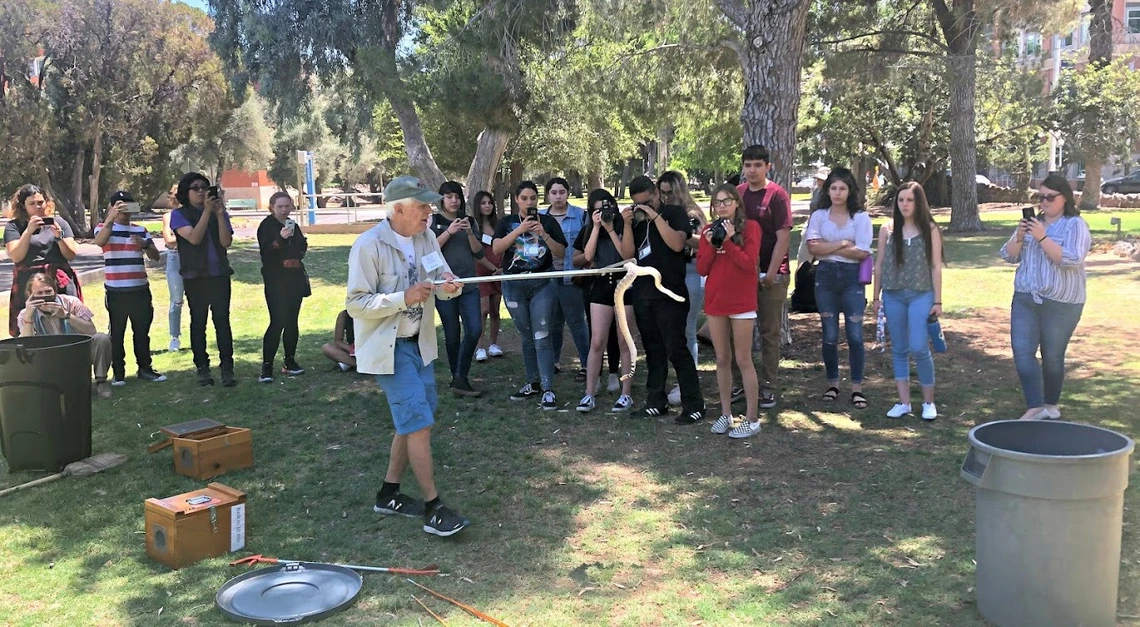
Dr. Cecil Schwalbe told high school students about how to handle a rattlesnake during the 2019 Donald W. Carson Journalism Diversity Workshop.
Photo by Mike Chesnick
Dr. Cecil Robert Schwalbe, beloved husband, brother, father, grandfather and friend, died April 3, 2022, at the age of 80 in his hometown of Tucson, Arizona.
If the mark of a life well-lived is to leave the people you loved better than you found them, Cecil lived the best life humanly possible, and leaves the following people way better than he found them: wife Carol Bittig Schwalbe, sister Nanette Schwalbe Alvarez, sons Adam Benjamin Schwalbe and Ethan Hastings Schwalbe, their mother Diane Hastings Hileman, granddaughters Sarah Abigail Schwalbe and Cecilia Ann Schwalbe, and their mother, Lani Diane Rich.
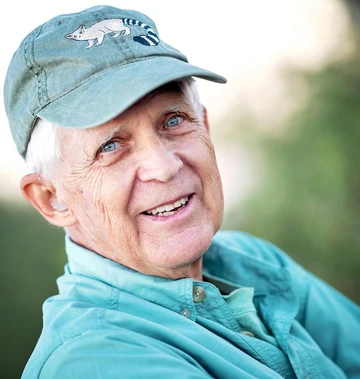
Dr. Cecil Schwalbe
Photo by John de Dios
Dr. Cecil Robert Schwalbe was born April 2, 1942, in Lubbock, Texas, and had a passion for all things natural from an early age. As a third-grader growing up in Dallas, Cecil wrote to all the game and fish departments in the United States, asking for information about wildlife. He later became an Eagle Scout.
During the Vietnam War, Cecil served in the U.S. Army (1964-66) and sailed aboard one of the first troop ships carrying 4,000 active combat soldiers to Vietnam. His Boy Scout training prepared him for sleeping on the deck, where the air was much fresher than in the hold below. He received sharpshooter and expert rifle commendations and a good conduct medal.
Back home, Cecil earned a degree in mechanical engineering from Rice University before realizing he didn’t want to be an engineer. He pivoted, went to the University of Washington and received his master’s degree in environmental science and ecology, and then moved to Tucson to pursue his Ph.D. in zoology and physiology at the University of Arizona, where he also taught for many years.
The first state herpetologist of Arizona, Cecil dedicated his professional life to the research and conservation of amphibians and reptiles of the Southwest, and his personal life to brightening every room he walked into with his inexhaustible kindness and irrepressible sense of humor. He was as nimble at playing Boggle and Words with Friends as he was at wrangling snakes, lizards and graduate students.
One of the most famous quotes attributed to Cecil is “Anyone who gets bitten by a Gila monster deserves it.” This was the quote that delighted the EMTs who referenced The Venomous Reptiles of Arizona (co-authored with Charles Lowe and Terry Johnson) while attending to Cecil after he was bit by a Gila monster during a presentation.
Dr. Cecil Robert Schwalbe, who often said that his initials CRS stood for “can’t remember s***,” lived a life of passion and enthusiasm doing what he loved best—making the desert environment a safer place for the animals he loved and cracking a stream of consistently above-average jokes about pretty much everything. Everyone knew when Cecil was in the Biosciences East Building on campus because you could hear his contagious laughter from every floor.
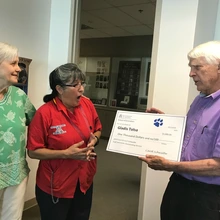
Carol and Cecil Schwalbe endowed a staff award at the School of Journalism. The first recipient in 2019 was Gladis Tolsa.
Photo by Mike Chesnick
Sporting a luxurious head of shock-white hair from a young age and emitting a frequent chuckle that somehow remained boyish even into his 70s, Cecil has educated thousands on the reptiles and amphibians he loved so much via an array of research papers, books, classes and personal appearances.
(He generously spoke to undergrad and grad students at the UA School of Journalism, where Carol is a professor, and to high school students at the Donald W. Carson Journalism Diversity Workshop during the summer. Students practiced their photo and video skills and interviewed Cecil about his work. He and Carol also endowed a staff award for the School of Journalism.)
Cecil has been featured in many nature documentaries and met his wife, Carol, when she was writing a story about the Institute of Desert Ecology for National Geographic Traveler magazine, where she worked as an editor.
Carol—who describes herself as “more of a cat person”—fell in love with and married Cecil despite the fact that he kept a room full of snakes and lizards in his house, some of which were venomous. Cecil, no great fan of needles, got weekly shots for years so that his extreme cat allergy wouldn’t kill him as he wooed and wed the woman he loved.
“I only keep animals that dote on benign neglect,” Cecil said in an interview with Tucson Weekly. He is also survived by two beloved cats, Cocoa and Blue, and three Sonoran desert tortoises.
And, of course … all the snakes and lizards.
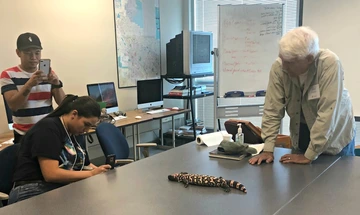
Cecil Schwalbe introduced high school journalism students to a gila monster in 2019.
Photo by Mike Chesnick
Dr. Cecil Robert Schwalbe, in addition to having been bitten by a Gila monster, has been sprayed in the face with the venom from a spitting cobra, and once narrowly escaped being bitten by a rattlesnake during a feeding. None of these experiences ever dampened his passion for the animals he worked so hard to protect, despite the fact that a diamondback rattler killed his great-grandmother at the Schwalbe family farm in central Texas back in 1917.
“I’m kind of a black sheep in the family,” Cecil said in an article for Arizona Wildlife Views. “Since [the death of my great-grandmother], the Schwalbe clan in that neck of the woods has been kind of anti-rattlesnake.”
An ecologist with the U.S. Geological Survey, Cecil technically retired in 2013, but his life’s work of caring for the animals and desert he loved never so much as paused. What Cecil did professionally was never just a job; it was an undeniable part of who he was. He never had to grow up, and brought the childlike wonder that inspired those letters to game and fish departments in the third grade into everything he did.
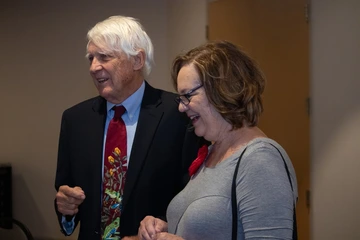
Cecil Schwalbe and his sister, Nanette Alvarez, attended the 2019 Zenger Award for Press Freedom luncheon.
Photo by Nick Smallwood
Cecil’s lasting and important contributions to scientific research and conservation earned him many awards. In 2015 the Western National Parks Association honored him with the Emil W. Haury Award, which recognizes outstanding contributions to scientific research in national parks and monuments. Just last year he was thrilled to receive the Charlie Painter Memorial Award from the Southwest Partners in Amphibian and Reptile Conservation. He was nominated by a very large number of his former students and colleagues.
Over the course of his career teaching at the University of Arizona, he mentored a parade of master’s and Ph.D. students who are now scientists continuing the work of tirelessly protecting and nurturing the desert habitat Cecil loved so well. Cecil has educated many, amused many more, and loved his family and his work without qualification or reservation. The impact of Cecil’s research, educational outreach, humor and kindness will live on in everyone who ever knew him, because to know Cecil is to carry a bit of him with you in your heart forever.
Dr. Cecil Robert Schwalbe—Eagle Scout, veteran, scientist, educator, wordsmith, shameless teller of dad jokes, nature’s protector and the best friend any reptile ever had—died after a life so well-lived that all who have spent any time in his presence, from those who knew and loved him best to the people he met in passing, are all left better than he found them.
And you really can’t ask for better than that, can you?
Donations to Cold-Blooded Research Fund
In lieu of flowers, donations can be made in memory of Cecil to the Cold-Blooded Research Fund in the School of Natural Resources and the Environment: https://give.uafoundation.org/cecilschwalbe. In keeping with Cecil’s profession and passion, the annual payout from this endowed fund will support research awards for undergraduate students, graduate students and faculty members who are studying amphibians, reptiles or fish in SNRE.
A celebration of Cecil’s life and many legends—Saturday, May 14, at 10 a.m.
You’re invited to a celebration of Cecil’s life and many legends on Saturday, May 14, at 10 a.m. in the ENR2 Building on the University of Arizona campus. The entrance to ENR2 is at 1064 East Lowell Street, which is just west of the Sixth Street Garage. Come to Room N120. We hope you’ll stay afterward for light refreshments in the courtyard. Please RSVP by Saturday, May 7, at https://tinyurl.com/cecilschwalbe
The closest parking garages are the Sixth Street Garage and the Tyndall Avenue Garage. You might also be able to snag a parking spot on the streets south of Sixth Street. Check the campus map below: https://map.arizona.edu//
Based on current public health conditions and aligned with CDC guidance, the University of Arizona recommends but does not require masks in indoor spaces.
If you can’t attend the May 14 celebration in person, you can watch the Facebook livestream at http://Bit.Ly/3LOTuay This Facebook page is also a virtual gathering place for all the people who loved and shared the world with our beloved Snakeman. Please add your photos, videos and written remembrances and stories.

